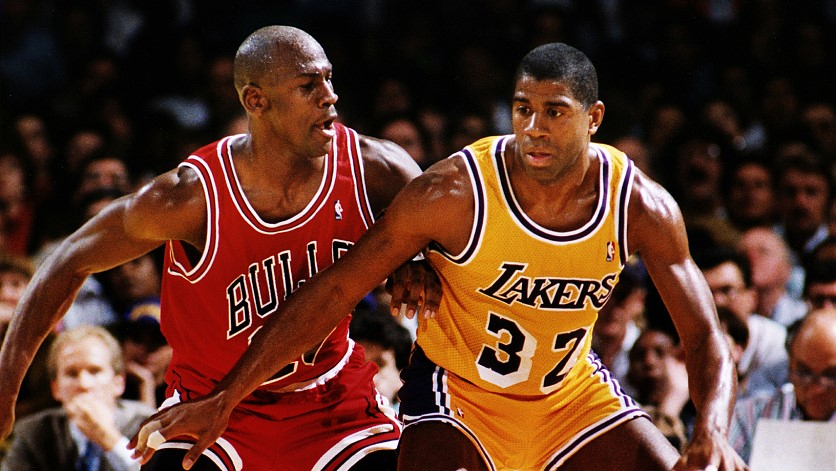
Michael Jordan (L) of the Chicago Bulls defends Magic Johnson of the Los Angeles Lakers in the 1991 NBA Finals. /VCG
Michael Jordan (L) of the Chicago Bulls defends Magic Johnson of the Los Angeles Lakers in the 1991 NBA Finals. /VCG
The year of 1991 was special for Michael Jordan. After three lost series, he finally led the Chicago Bulls past the Detroit Pistons. He had his second NBA Most Valuable Player award and fifth scoring champion. Considering that he already won the Defensive Player of the Year award in 1988, Jordan in 1991 was already the best individual basketball player on earth.
He was about to meet the Los Angeles Lakers and Magic Johnson in the Finals.
Thirty-one-year-old Johnson was already five-time NBA champion, three-time Finals MVP, three-time MVP, four-time assist leader, and one of the two smartest, most all-round players of the league – the other was Larry Bird. He led the Lakers "Show Time" era and was seen as a born winner and team leader.
June 2, 1991, Chicago Stadium, Game 1. Witnessed by a total of 18,676 fans, including the 11 brothers and sisters of Scottie Pippen, Jordan was on full power from the first quarter – he scored 15 points, three rebounds and five assists in the first 12 minutes. After the first half, he and Pippen already got 29 points.
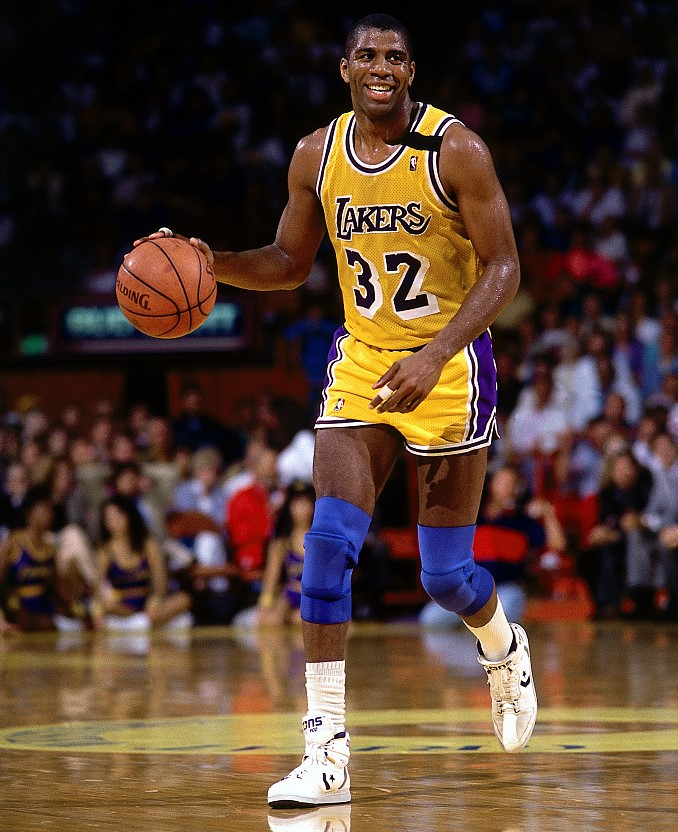
Magic Johnson of the Los Angeles Lakers handles the ball in the game at The Forum in Inglewood, California. /VCG
Magic Johnson of the Los Angeles Lakers handles the ball in the game at The Forum in Inglewood, California. /VCG
However, the Bulls only led 53-51. Johnson payed the commanding role as he always did. Thanks to his orchestrating, James Worthy and Sam Perkins both had 14 points in the first two quarters. Then there's was the turning point in the third quarter: Jordan needed to rest, the Bulls only got 15 points, Johnson suddenly buried two 3-pointers in the end. The Lakers entered the last quarter leading 75-68.
Jordan did not want to give up. He scored 13 points in Q4 but missed the last shot. Before that, Perkins, who joined the NBA in the same year (1984) from the same university (North Carolina Tar Heels), made the game-winning 3-pointer. 92-91, the purple and gold broke Chicago's home court advantage.
Jordan did a good job as an individual player. He went 14-24 to get 36 points, eight rebounds, 12 assists, and three steals. Nonetheless, the whole team's field goal rate was only 48 percent. Jordan and Pippen were the only two who reached double digits in scoring. By contrast, Perkins, James Worthy, and Vlade Divac dropped 22, 22, and 16 points for the Lakers. Johnson only shot five times but made four to get a triple-double of 19 points, 10 rebounds, and 11 assists.
So, were they right calling Johnson a better leader than Jordan?
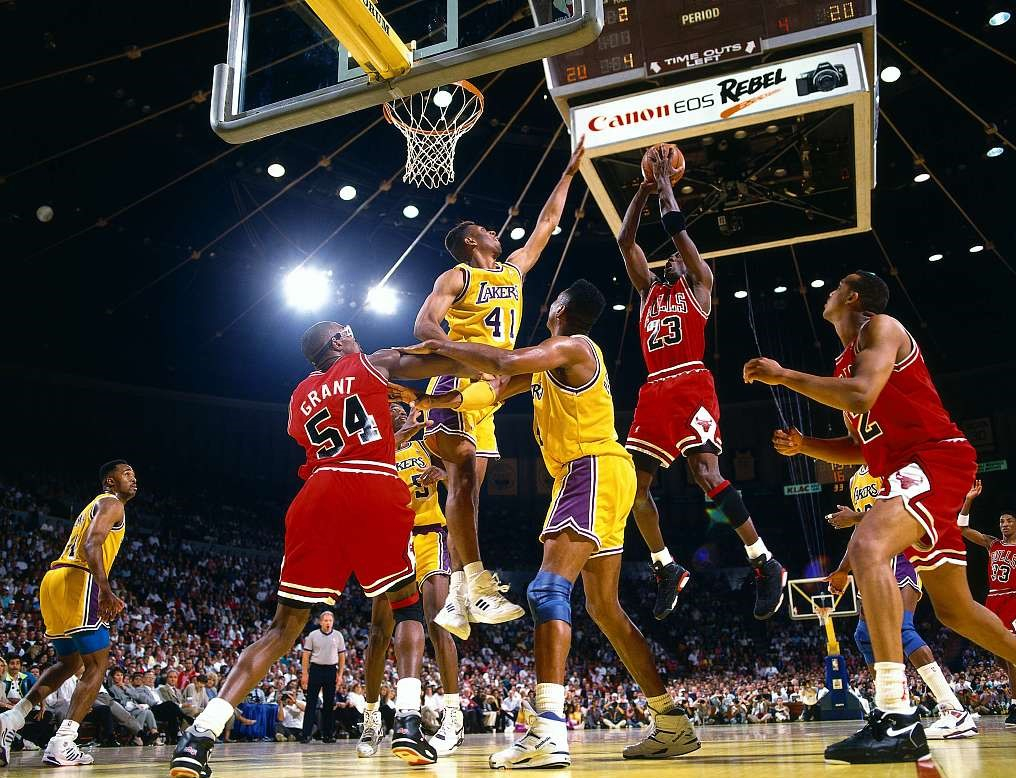
Michael Jordan #23 of the Chicago Bulls shoots the ball in Game 3 of the NBA Finals against the Los Angeles Lakers at The Forum, June 7, 1991. /VCG
Michael Jordan #23 of the Chicago Bulls shoots the ball in Game 3 of the NBA Finals against the Los Angeles Lakers at The Forum, June 7, 1991. /VCG
Chicago's No. 23 gave his answer in Game 2. In the first 20 minutes, he only scored two points but kept making smart passing to Horace Grant and Bill Cartwright under the rim. Big men had to find their game first before the team could win, that's what Jordan learnt from Johnson. After the first half, Grant already had 14 points and the Bulls led 58-53.
Then Jordan began to take over in the third quarter. From the last four minutes in Q2, he made 13 straight shots. The game soon became a foregone conclusion as the Bulls expanded their lead to 26 points in the second half. In the end, the home team won 107-86. Jordan was 15-18 to put down 33 points, seven rebounds, and 13 assists.
More importantly, this time he was the one who helped teammates perform better: Grant had 20, Cartwright 12, John Paxson was perfect 8-8 to score 16 points. By contrast, Johnson struggled to get 14 points (4-13) and 10 assists under the defense of Pippen.
Game 3 at The Forum in LA proceeded almost like G1. The Bulls led in the first half, Johnson led the counter strike in Q3, helping the Lakers regain a big lead. Yet this time, Jordan made sure that history did not repeat itself.
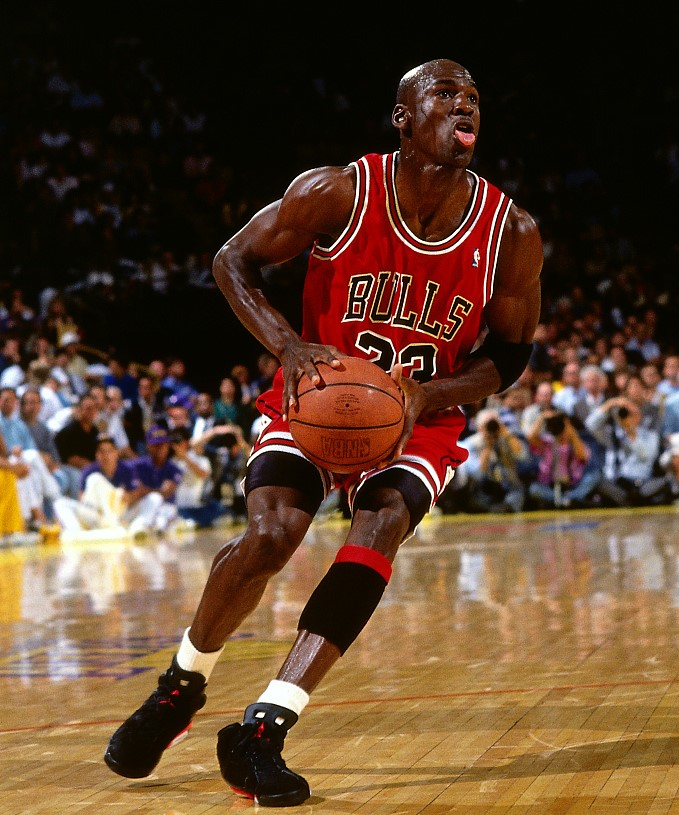
Michael Jordan of the Chicago Bulls prepares to shoot the ball in Game 3 of the NBA Finals against the Los Angeles Lakers at The Forum, June 7, 1991. /VCG
Michael Jordan of the Chicago Bulls prepares to shoot the ball in Game 3 of the NBA Finals against the Los Angeles Lakers at The Forum, June 7, 1991. /VCG
In the fourth quarter, Jordan carried the Bulls on his shoulders and kept narrowing down the score difference. This time, Divac stood out for the Lakers by finishing a three-point play to help the purple and gold lead 92-90. Moreover, Pippen was fouled out.
With 10.9 seconds left, Jordan was looking at a two-point trail, in an away game. If they lose, the next two games would still happen in LA.
He handled the ball, dodged Byron Scott – the rest of the Lakers did not trap him but chose to stay in the paint to protect the rim. Jordan dodged Scott, stepped into the free throw line, pulled up and shot. The ball flew over 2.16-meter-tall Divac and his raised long arms, splash. 92-92, overtime.
Jordan did not leave the Lakers any chance in OT. With two layups and two free throws, he made the Bulls the leading side (2-1).
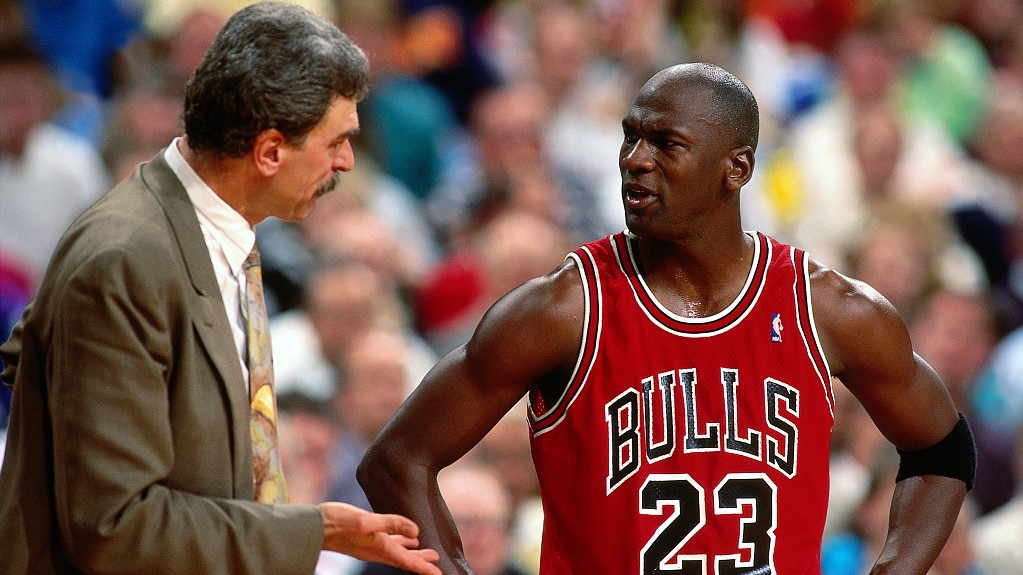
Phil Jackson (L), head coach of the Chicago Bulls talks to Michael Jordan in the game, 1991. /VCG
Phil Jackson (L), head coach of the Chicago Bulls talks to Michael Jordan in the game, 1991. /VCG
The Lakers added a full training program before Game 4 at the closed arena of The Forum but that seemed to have backfired: their players were older compared with the Bulls and they needed to save strength, not consume them in extra training. Furthermore, Bulls head coach Phil Jackson revealed his opponents' weakness: the Lakers did not have a second leader if Johnson was not on the court, but the Bulls already knew how to play without Jordan.
Both became the decisive factors in this game. The Lakers worked hard in the first quarter – they grabbed seven offensive rebounds – and led 28-27. Nonetheless, they began to lose since Johnson sat on the bench. The Bulls took the lead with a 19-9 run. Johnson's did not seem to help. The purple and gold's FG rate was only 25 percent in the second quarter.
The home team's misfortune was not over yet. In the second half, both Worthy and Scott quit because of injuries. The Bulls continued to torture the opponents with their smothering defense – in Q2 and Q3, the Lakers went 12-41. In the end, they lost 97-82 with a humiliating 37 percent FG rate. By the way, 82 was the lowest Finals game scoring in Lakers' history since the introduction of 24-second violation.
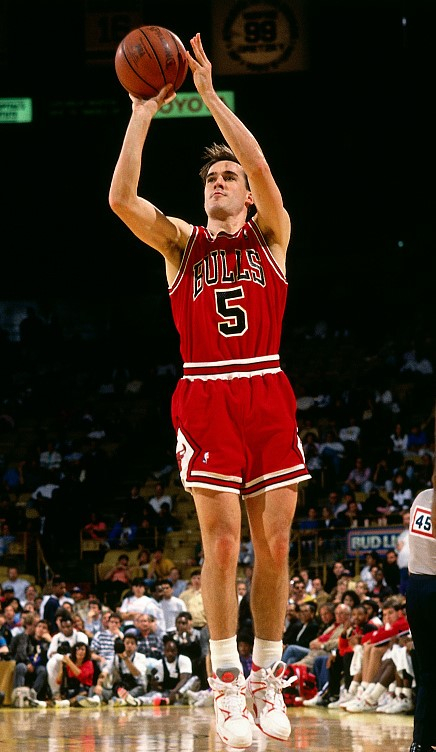
John Paxson of the Chicago Bulls shoots the ball in Game 3 of the NBA Finals against the Los Angeles Lakers at The Forum, June 7, 1991. /VCG
John Paxson of the Chicago Bulls shoots the ball in Game 3 of the NBA Finals against the Los Angeles Lakers at The Forum, June 7, 1991. /VCG
A 3-1 lead, plus the fact that the opponents lost their best scorer and the best shooter. Jordan and the Bulls went so close winning their first title. He admitted later, before Game 5, he was so nervous that he did not know how to receive the title.
Meanwhile, the Lakers showed the world why they were one of the greatest teams in NBA history. They were on the edge of the cliff, but they would fight till death instead of tying their hands and concede defeat.
The purple and gold led 49-48 in the first half, kept the game a draw 80-80 after Q3 and even led 91-90 after the first six minutes of Q4. Johnson put down 16 points, 11 rebounds, and 20 assists, leading his teammates in his last battle.
Jackson called a timeout, asking Jordan the same question he already asked in the halftime break: Michael, who's open? The answer was Paxson and Jordan gave the answer via continuous passing to the 31-year-old perimeter shooting master. In the last four minutes, Paxson scored 10 minutes.
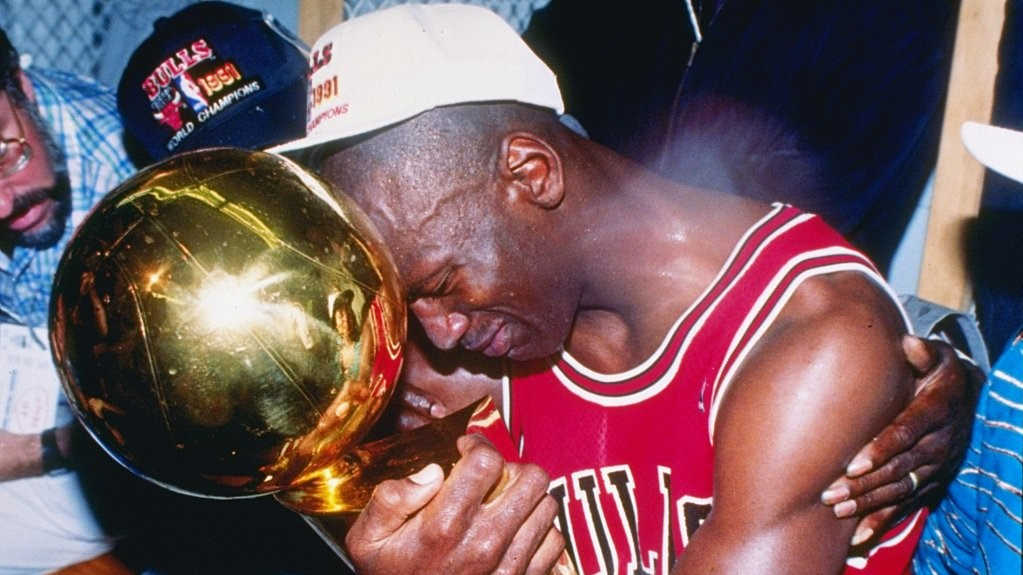
Michael Jordan of the Chicago Bulls holds the Larry O'Brien NBA Championship Trophy after defeating the Los Angeles Lakers 4-1 in the NBA Finals at The Forum, June 12, 1991. /VCG
Michael Jordan of the Chicago Bulls holds the Larry O'Brien NBA Championship Trophy after defeating the Los Angeles Lakers 4-1 in the NBA Finals at The Forum, June 12, 1991. /VCG
"I don't remember it quite that way and it wasn't nearly as dramatic, but the thing that was pointed out was that Magic (Johnson) had been guarding me. Their defense, as a lot of teams did, overloaded on Michael. Phil was just making Michael aware that Magic was sagging off me to help double team Michael at times. I found myself open," recalled Paxson.
With a 108-101 score, the Bulls claimed victory of Game 5 and 4-1 of the 1991 NBA Finals.
Having averaged 31.2 points, 6.6 rebounds, 11.4 assists, and 2.8 steals per game, 28-year-old Jordan pocketed his first NBA championship after seven years. He held the trophy with two arms, crying like a child in the locker room.
The Chicago Bulls Dynasty began.